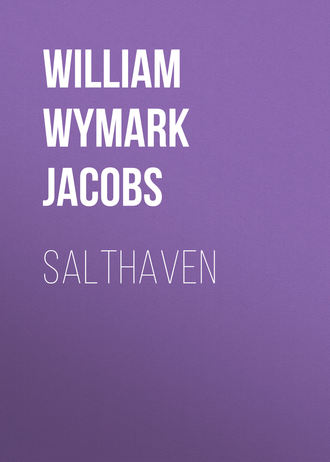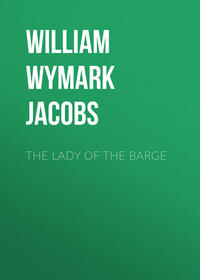 полная версия
полная версияSalthaven
Miss Jelks went as far as the sideboard, and, taking out a tablecloth, proceeded to set the breakfast, regarding the captain with unaffected interest as she worked.
"He ain't been very well the last day or two," she said, blandly.
The captain ignored her.
"Seems to have something on his mind," continued Miss Jelks, with a toss of her head, as she placed the sugar-bowl and other articles on the table.
The captain regarded her steadily for a moment, and then, turning, took up a newspaper.
"I should think he never was what you'd call a strong man," murmured Miss Jelks. "He ain't got the look of it."
The captain's temper got the better of him. "Who are you talking about?" he demanded, turning sharply.
Miss Jelks's eyes shone, but there was no hurry, and she smoothed down a corner of the tablecloth before replying.
"Your father-in-law, sir," she said, with a faint air of surprise.
Captain Trimblett turned hastily to his paper again, but despite his utmost efforts a faint wheezing noise escaped him and fell like soft music on the ears of Miss Jelks. In the hope that it might be repeated, or that manifestations more gratifying still might be vouchsafed to her, she lingered over her task and coughed in an aggressive fashion at intervals.
She was still busy when Hartley came downstairs, and, stopping for a moment at the doorway, stood regarding the captain with a look of timid disapproval. The latter rose and, with a significant glance in the direction of Rosa, shook hands and made a remark about the weather.
"When did you return?" inquired Hartley, trying to speak easily.
"Last night," said the other. "I came on here, but you were out."
Hartley nodded, and they sat eying each other uneasily and waiting for the industrious Rosa to go. The captain got tired first, and throwing open the French windows slipped out into the garden and motioned to Hartley to follow.
"Joan wrote to you," he said, abruptly, as soon as they were out of earshot.
"Yes," said the other, stiffly.
"Understand, it wasn't my fault," said the captain, warmly. "I wash my hands of it. I told her not to."
"Indeed!" said Hartley, with a faint attempt at sarcasm. "It was no concern of mine, of course."
The captain turned on him sharply, and for a moment scathing words hung trembling on his lips. He controlled himself by an effort.
"She wrote to you," he said, slowly, "and instead of waiting to see me, or communicating with me, you spread the news all over the place."
"Nothing of the kind," said Hartley. "As a matter of fact, it's not a thing I am anxious to talk about. Up to the present I have only told Rosa."
"Only!" repeated the choking captain. "Only! Only told Rosa! Where was the town-crier? What in the name of common-sense did you want to tell her for?"
"She would have to be told sooner or later," said Hartley, staring at him, "and it seemed to me better to tell her before Joan came home. I thought Joan would prefer it; and if you had heard Rosa's comments I think that you'd agree I was right."
The captain scarcely listened. "Well, it's all over Salthaven by now," he said, resignedly.
He seated himself on the bench with his hands hanging loosely between his knees, and tried to think. In any case he saw himself held up to ridicule, and he had a strong feeling that to tell the truth now would precipitate a crisis between Vyner and his chief clerk. The former would probably make a fairly accurate guess at the circumstances responsible for the rumour, and act accordingly. He glanced at Hartley standing awkwardly before him, and, not without a sense of self-sacrifice, resolved to accept the situation.
"Yes; Rosa had to be told," he said, philosophically. "Fate again; you can't avoid it."
Hartley took a turn or two up and down the path.
"The news came on me like a—like a thunderbolt," he said, pausing in front of the captain. "I hadn't the slightest idea of such a thing, and if I say what I think—"
"Don't!" interrupted the captain, warmly. "What's the good?"
"When were you married?" inquired the other. "Where were you married?"
"Joan made all the arrangements," said the captain, rising hastily. "Ask her."
"But—" said the astonished Hartley.
"Ask her," repeated the captain, walking toward the house and flinging the words over his shoulder. "I'm sick of it."
He led the way into the dining-room and, at the other's invitation, took a seat at the breakfast-table, and sat wondering darkly how he was to get through the two days before he sailed. Hartley, ill at ease, poured him out a cup of coffee and called his attention to the bacon-dish.
"I can't help thinking," he said, as the captain helped himself and then pushed the dish toward him—"I can't help thinking that there is something behind all this; that there is some reason for it that I don't quite understand."
The captain started. "Never mind," he said, with gruff kindness.
"But I do mind," persisted the other. "I have got an idea that it has been done for the benefit—if you can call it that—of a third person."
The captain eyed him with benevolent concern. "Nonsense," he said, uneasily. "Nothing of the kind. We never thought of you."
"I wasn't thinking of myself," said Hartley, staring; "but I know that Joan was uneasy about you, although she pretended to laugh at it. I feel sure in my own mind that she has done this to save you from Mrs. Chinnery. If it hadn't—"
He stopped suddenly as the captain, uttering a strange gasping noise, rose and stood over him. For a second or two the captain stood struggling for speech, then, stepping back with a suddenness that overturned his chair, he grabbed his cap from the sideboard and dashed out of the house. The amazed Mr. Hartley ran to the window and, with some uneasiness, saw his old friend pelting along at the rate of a good five miles an hour.
Breathing somewhat rapidly from his exertions, the captain moderated his pace after the first hundred yards, and went on his way in a state of mind pretty evenly divided between wrath and self-pity. He walked in thought with his eyes fixed on the ground, and glancing up, too late to avoid him, saw the harbour-master approaching.
Captain Trimblett, composing his features to something as near his normal expression as the time at his disposal would allow, gave a brief nod and would have passed on. He found his way, however, blocked by sixteen stone of harbour-master, while a big, red, clean-shaven face smiled at him reproachfully.
"How are you?" said Trimblett, jerkily.
The harbour-master, who was a man of few words, made no reply. He drew back a little and, regarding the captain with smiling interest, rolled his head slowly from side to side.
"Well! Well! Well!" he said at last.
Captain Trimblett drew himself up and regarded him with a glance the austerity of which would have made most men quail. It affected the harbourmaster otherwise.
"C—ck!" he said, waggishly, and drove a forefinger like a petrified sausage into the other's ribs.
The assault was almost painful, and, before the captain could recover, the harbour-master, having exhausted his stock of witticisms, both verbal and physical, passed on highly pleased with himself.
It was only a sample of what the day held in store for the captain, and before it was half over he was reduced to a condition of raging impotence. The staff of Vyner and Son turned on their stools as one man as he entered the room, and regarded him open-eyed for the short time that he remained there. Mr. Vyner, senior, greeted him almost with cordiality, and, for the second time in his experience, extended a big white hand for him to shake.
"I have heard the news, captain," he said, in extenuation.
Captain Trimblett bowed, and in response to an expression of good wishes for his future welfare managed to thank him. He made his escape as soon as possible, and, meeting Robert Vyner on the stairs, got a fleeting glance and a nod which just admitted the fact of his existence.
The most popular man in Salthaven for the time being, he spent the best part of the day on board his ship, heedless of the fact that numerous acquaintances were scouring the town in quest of him. One or two hardy spirits even ventured on board, and, leaving with some haste, bemoaned, as they went, the change wrought by matrimony in a hitherto amiable and civil-spoken mariner.
The one drop of sweetness in his cup was the news that Mrs. Chinnery was away from home for a few days, and after carefully reconnoitring from the bridge of the Indian Chief that evening he set off to visit his lodgings. He reached Tranquil Vale unmolested, and, entering the house with a rather exaggerated air of unconcern, nodded to Mr. Truefitt, who was standing on the hearthrug smoking, and hung up his cap. Mr. Truefitt, after a short pause, shook hands with him.
"She's away," he said, in a deep voice.
"She? Who?" faltered the captain.
"Susanna," replied Mr. Truefitt, in a deeper voice still.
The captain coughed and, selecting a chair with great care, slowly seated himself.
"She left you her best wishes," continued Mr. Truefitt, still standing, and still regarding him with an air of severe disapproval.
"Much obliged," murmured the captain.
"She would do it," added Mr. Truefitt, crossing to the window and staring out at the road with his back to the captain. "And she said something about a silver-plated butter-dish; but in the circumstances I said 'No.' Miss Willett thought so too."
"How is Miss Willett?" inquired the captain, anxious to change the subject.
"All things considered, she's better than might be expected," replied Mr. Truefitt, darkly.
Captain Trimblett said that he was glad to hear it, and, finding the silence becoming oppressive, inquired affectionately concerning the health of Mrs. Willett, and learned to his discomfort that she was in the same enigmatical condition as her daughter.
"And my marriage is as far off as ever," concluded Mr. Truefitt. "Some people seem to be able to get married as often as they please, and others can't get married at all."
"It's all fate," said the captain, slowly; "it's all arranged for us."
Mr. Truefitt turned and his colour rose.
"Your little affair was arranged for you, I suppose?" he said, sharply.
"It was," said the captain, with startling vehemence.
Mr. Truefitt, who was lighting his pipe, looked up at him from lowered brows, and then, crossing to the door, took his pipe down the garden to the summer-house.
CHAPTER XVIII
THIS time to-morrow night," said Mr. Walters, as he slowly paced a country lane with Miss Jelks clinging to his arm, "I shall be at sea."
Miss Jelks squeezed his arm and gave vent to a gentle sigh. "Two years'll soon slip away," she remarked. "It's wonderful how time flies. How much is twice three hundred and sixty-five?"
"And you mind you behave yourself," said the boatswain, hastily. "Remember your promise, mind."
"Of course I will," said Rosa, carelessly.
"You've promised not to 'ave your evening out till I come back," the boatswain reminded her; "week-days and Sundays both. And it oughtn't to be no 'ardship to you. Gals wot's going to be married don't want to go gadding about."
"Of course they don't," said Rosa. "I shouldn't enjoy being out without you neither. And I can get all the fresh air I want in the garden."
"And cleaning the winders," said the thoughtful boatswain.
Miss Jelks, who held to a firm and convenient belief in the likeness between promises and piecrusts, smiled cheerfully.
"Unless I happen to be sent on an errand I sha'n't put my nose outside the front gate," she declared.
"You've passed your word," said Mr. Walters, slowly, "and that's good enough for me; besides which I've got a certain party wot's promised to keep 'is eye on you and let me know if you don't keep to it."
"Eh?" said the startled Rosa. "Who is it?"
"Never you mind who it is," said Mr. Walters, judicially. "It's better for you not to know, then you can't dodge 'im. He can keep his eye on you, but there's no necessity for you to keep your eye on 'im. I don't mind wot he does."
Miss Jelks maintained her temper with some difficulty; but the absolute necessity of discovering the identity of the person referred to by Mr. Walters, if she was to have any recreation at all during the next two years, helped her.
"He'll have an easy job of it," she said, at last, with a toss of her head.
"That's just wot I told 'im," said the boatswain. "He didn't want to take the job on at first, but I p'inted out that if you behaved yourself and kept your promise he'd 'ave nothing to do; and likewise, if you didn't, it was only right as 'ow I should know. Besides which I gave 'im a couple o' carved peach stones and a war-club that used to belong to a Sandwich Islander, and took me pretty near a week to make."
Miss Jelks looked up at him sideways. "Be a bit of all right if he comes making up to me himself," she said, with a giggle. "I wonder whether he'd tell you that?"
"He won't do that," said the boatswain, with a confident smile. "He's much too well-behaved, 'sides which he ain't old enough."
Miss Jelks tore her arm away. "You've never been and set that old-fashioned little shrimp Bassett on to watch me?" she said, shrilly.
"Never you mind who it is," growled the discomfited boatswain. "It's got nothing to do with you. All you've got to know is this: any time 'e sees you out—this party I'm talking of—he's going to log it. He calls it keeping a dairy, but it comes to the same thing."
"I know what I call it," said the offended maiden, "and if I catch that little horror spying on me he'll remember it."
"He can't spy on you if you ain't out," said the boatswain. "That's wot I told 'im; and when I said as you'd promised he saw as 'ow it would be all right. I'm going to try and bring him 'ome a shark's tooth."
"Goin' to make it?" inquired Rosa, with a sniff.
"And might I ask," she inquired, as the amorous boatswain took her arm again, "might I ask who is going to watch you?"
"Me?" said the boatswain, regarding her with honest amazement. "I don't want no watching. Men don't."
"In—deed!" said Miss Jelks, "and why not?"
"They don't like it," said Mr. Walters, simply.
Miss Jelks released her arm again, and for some time they walked on opposite sides of the lane Her temper rose rapidly, and at last, tearing off her glove, she drew the ring from her finger and handed it to the boatswain.
"There you are!" she exclaimed. "Take it!"
Mr. Walters took it, and, after a vain attempt to place it on his little finger, put it in his waistcoat-pocket and walked on whistling.
"We're not engaged now," explained Rosa.
"Aye, aye," said the boatswain, cheerfully. "Only walking out."
"Nothing of the kind," said Rosa. "I sha'n't have nothing more to do with you. You'd better tell Bassett."
"What for?" demanded the other.
"What for?" repeated Rosa. "Why, there's no use him watching me now."
"Why not?" demanded Mr. Walters.
Miss Jelks caught her breath impatiently. "Because it's got nothing to do with you what I do now," she said, sharply. "I can go out with who I like."
"Ho!" said the glaring Mr. Walters. "Ho! Can you? So that's your little game, is it? Here—"
He fumbled in his pocket and, producing the ring, caught Miss Jelks's hand in a grip that made her wince, and proceeded to push it on her little finger. "Now you behave yourself, else next time I'll take it back for good."
Miss Jelks remonstrated, but in vain. The boatswain passed his left arm about her waist, and when she became too fluent increased the pressure until she gasped for breath. Much impressed by these signs of affection she began to yield, and, leaning her head against his shoulder, voluntarily renewed her vows of seclusion.
She went down to the harbour next day to see him off, and stood watching with much interest the bustle on deck and the prominent share borne by her masterful admirer. To her thinking, Captain Trimblett, stiff and sturdy on the bridge, played but a secondary part. She sent the boatswain little signals of approval and regard, a proceeding which was the cause of much subsequent trouble to a newly joined A.B. who misunderstood their destination. The warps were thrown off, a bell clanged in the engine-room, the screw revolved, and a gradually widening piece of water appeared between the steamer and the quay. Men on board suspended work for a moment for a last gaze ashore, and no fewer than six unfortunates responded ardently to the fluttering of her handkerchief. She stood watching until the steamer had disappeared round a bend in the river, and then, with a sense of desolation and a holiday feeling for which there was no outlet, walked slowly home.
She broke her promise to the boatswain the following evening. For one thing, it was her "evening out," and for another she felt that the sooner the Bassett nuisance was stopped, the better it would be for all concerned. If the youth failed to see her she was the gainer to the extent of an evening in the open air, and if he did not she had an idea that the emergency would not find her unprepared.
She walked down to the town first and spent some time in front of the shop-windows. Tiring of this, she proceeded to the harbour and inspected the shipping, and then with the feeling strong upon her that it would be better to settle with Bassett at her own convenience, she walked slowly to the small street in which he lived, and taking up a position nearly opposite his house paced slowly to and fro with the air of one keeping an appointment. She was pleased to observe, after a time, a slight movement of the curtains opposite, and, satisfied that she had attained her ends, walked off. The sound of a street door closing saved her the necessity of looking round.
At first she strolled slowly through the streets, but presently, increasing her pace, resolved to take the lad for a country walk. At Tranquil Vale she paused to tie up her boot-lace, and, satisfying herself that Bassett was still in pursuit, set off again.
She went on a couple of miles farther, until turning the sharp corner of a lane she took a seat on the trunk of a tree that lay by the side and waited for him to come up. She heard his footsteps coming nearer and nearer, and with a satisfied smile noted that he had quickened his pace. He came round the corner at the rate of over four miles an hour, and, coming suddenly upon her, was unable to repress a slight exclamation of surprise. The check was but momentary, and he was already passing on when the voice of Miss Jelks, uplifted in sorrow, brought him to a standstill.
"Oh, Master Bassett," she cried, "I am surprised! I couldn't have believed it of you."
Bassett, squeezing his hands together, stood eying her nervously.
"And you so quiet, too," continued Rosa; "but there, you quiet ones are always the worst."
The boy, peering at her through his spectacles, made no reply.
"The idea of a boy your age falling in love with me," said Rosa, modestly lowering her gaze.
"What!" squeaked the astonished Bassett, hardly able to believe his ears.
"Falling in love and dogging my footsteps," said Rosa, with relish, "and standing there looking at me as though you could eat me."
"You must be mad," said Bassett, in a trembling voice. "Stark staring mad."
"It's to make you leave off loving me," she explained
"Don't make it worse," said Rosa kindly. "I suppose you can't help it, and ought to be pitied for it really. Now I know why it was you winked at me when you came to the house the other day."
"Winked!" gasped the horrified youth. "Me?"
"I thought it was weakness of sight, at the time," said the girl, "but I see my mistake now. I am sorry for you, but it can never be. I am another's."
Bassett, utterly bereft of speech, stood eying her helplessly.
"Don't stand there making those sheep's eyes at me," said Rosa. "Try and forget me. Was it love at first sight, or did it come on gradual like?"
Bassett, moistening his tongue, shook his head.
"Am I the first girl you ever loved?" inquired Rosa, softly.
"No," said the boy. "I mean—I have never been in—love. I don't know what you are talking about."
"Do you mean to say you are not in love with me?" demanded Rosa, springing up suddenly.
"I do," said Bassett, blushing hotly.
"Then what did you follow me all round the town for, and then down here?"
Bassett, who was under a pledge of secrecy to the boatswain, and, moreover, had his own ideas as to the reception the truth might meet with, preserved an agonized silence.
"It's no good," said Rosa, eying him mournfully. "You can't deceive me. You are head over heels, and the kindest thing I can do is to be cruel to you—for your own sake."
She sprang forward suddenly, and, before the astounded youth could dodge, dealt him a sharp box on the ear. As he reeled under the blow she boxed the other.
"It's to make you leave off loving me," she explained; "and if I ever catch you following me again you'll get some more; besides which I shall tell your mother."
She picked up her parasol from the trunk, and after standing regarding him for a moment with an air of offended maidenhood, walked back to the town. Bassett, after a long interval, returned by another road.
CHAPTER XIX
JOAN HARTLEY returned to Salthaven a week after Captain Trimblett's departure, and, with a lively sense of her inability to satisfy the curiosity of her friends, spent most of the time indoors. To evade her father's inquiries she adopted other measures, and the day after her return, finding both her knowledge and imagination inadequate to the task of satisfying him, she first waxed impatient and then tearful. Finally she said that she was thoroughly tired of the subject, and expressed a fervent hope that she might hear no more about it. Any further particulars would be furnished by Captain Trimblett, upon his return.
"But when I asked him about it he referred me to you," said Hartley. "The whole affair is most incomprehensible."
"We thought it would be a surprise to you," agreed Joan.
"It was," said her father, gloomily. "But if you are satisfied, I suppose it is all right."
He returned to the attack next day, but gained little information. Miss Hartley's ideas concerning the various marriage ceremonies were of the vaguest, but by the aid of "Whitaker's Almanack" she was enabled to declare that the marriage had taken place by license at a church in the district where Trimblett was staying. As a help to identification she added that the church was built of stone, and that the pew-opener had a cough. Tiresome questions concerning the marriage certificate were disposed of by leaving it in the captain's pocket-book. And again she declared that she was tired of the subject.
"I can't imagine what your aunt was thinking about," said her father. "If you had let me write—"
"She knew nothing about it," said Joan, hastily; "and if you had written to her she would have thought that you were finding fault with her for not looking after me more. It's done now, and if I'm satisfied and Captain Trimblett is satisfied, that is all that matters. You didn't want me to be an old maid, did you?"
Mr. Hartley gave up the subject in despair, but Miss Willett, who called a day or two later, displayed far more perseverance. After the usual congratulations she sat down to discuss the subject at length, and subjected Joan to a series of questions which the latter had much difficulty in evading. For a newly married woman, Miss Willett could only regard her knowledge of matrimony as hazy in the extreme.
"She don't want to talk about it," said Mr. Truefitt, the following evening as he sat side by side with Miss Willett in the little summer-house overlooking the river. "Perhaps she is repenting it already."
"It ought to be a tender memory," sighed Miss Willett. "I'm sure—"
She broke off and blushed.
"Yes?" said Mr. Truefitt, pinching her arm tenderly.
"Never mind," breathed Miss Willett. "I mean—I was only going to say that I don't think the slightest detail would have escaped me. All she seems to remember is that it took place in a church."
"It must have been by license, I should think," said Mr. Truefitt, scowling thoughtfully. "Ordinary license, I should say. I have been reading up about them lately. One never knows what may happen."









